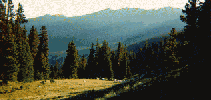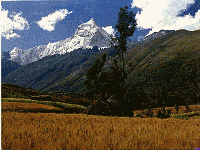"Legends of the Columbia"
edited by Ed and Megan BerwickStories/Poems of the Snake River/Shoshone Indians
"To awaken in a forest in Oregon is a sensation never to be forgotten. There is the spicy fragrance of the pines, the drumming of the pheasants, the murmur of the mountain stream, where tender green ferns and trailing vines swing and nod gently to the nibbling, silvery trout."

Eda-co-cha's Spirit Smiles
In Oregon, land
of the rain and sun,
Where rivers flow
And snowy mountains glow
In summer's sunset light,
Lived Tuala,
Chief of all the sunny plains,
Where grass is plenty
And sweet berries hide
And redden in the sun,
Until their blood like water runs
And stains the hoofs of deer
And feet of men.
Tuala wearied of summer's heat,
And with his tribe
Sought the forest shade.
His braves speared salmon
In waters where
Cool, rocky walls look down.
And here the old chief's daughter came
And brought her grasses,
And on yon rock sat down to weave.
As morning sun rose up
Each day she came.
Down with the
waters came Pa-hoo-ly,
Son of the rocky river gorge,
Guiding his light canoe.
His spear was long
And ever in his hand.
His sight was keen,
And on his spear
The writhing salmon hung.
Tall was his form
And strong his arm.
Brave and undaunted, great river's son,
Speed on thy way!
With morning
light Eda-coo-cha came
To the high rocky wall
Where the fast flowing waters
Sang to her a wild wailing song.
And on the rushing river,
Where fishes played,
Pa-hoo-ly, with his spear upraised,
Rode in his canoe.
Then down from where the rocks are bare
A branch of berries fell
Into his boat.
Pa-hoo-ly looked
and saw the maid.
He frowned and turned away,
And the currents of the river
Bore him along his rippling way
To where deep waters, darkening,
Received, on their cool floods,
Pa-hoo-ly, in his own swift, light canoe,
Without one murmur at the load
Upon their surface calm.
Other suns arose,
And to the river came
Each morn the dark-eyed Indian girl.
Then once again
The tall strong man
Like an arrow flew
Down the stream
In his light canoe.
And from where the maiden sat
Some camas, sweet,
Were thrown into his boat.
In morrow's mist
The chieftain's daughter stood
And watched for the river brave's return.
And like a flash he came;
And heeded Eda-coo-cha not,
As o'er the rocks was flung,
A fishing net,
Of woven grass roots,
Young and strong and light.
Tuala wearied
of mountain glen
And spoke of his sunny Tualitan plains.
He called his braves.
His daughter heard her chief's commands
And sighed and murmured not,
But once more sought the river bank
And waited long
For the light canoe.
When like the
fish hawk
Down the stream
The fearless boatman flew along,
Down from rocky heights
Tualitan chieftain's daughter fell.
The waters opened wide their arms
To receive her in her flight.
Yon misty cloud arose, remains!
And in its soft, swelling bosom,
Touched by light,
Eda-coo-cha's spirit smiles.
Legend of the Mountain and the Great Water Spirits

Ka-ou-whit-can (Tualitan)
"Nanage okoe moos moos! Hiuc mammuck tillicum! Wake, nica six."
The trees that
rise above us
Were only slender then,
Not half as high as these
That cast their cones
And prickly leaves
Down on the mountainside.
In illa-hee a spirit dwelt,
Great and wide and tall,
With antlers, on his tawny head,
That towered above the tallest trees.
Long hung his hair, like moss.
His arms were long,
And in his hand he held a bow
Whose arrows flew above the trees
And mountain snow
And were lost above the glistening stars,
Above the moon and rolling clouds.
When he called the forest shook
And trembled with his breath.
Old Ty-hee ruled the mountain men
Who camped within his glens.
Far within the
rushing waters
That flow through illa-hee
A spirit lives who rules all waters.
As they flow through rocky walls,
He bids them murmur softly
And creep around the rocks,
Or dash and foam and madly rush
Through the canyons misty gloom.
And the waters all obey him;
And the salmon in great shoals
Go rushing up the river,
To leap the rapid's foam
And stem the river's flow.
They go on through waters deep and shallow
Old Scoo-cum to obey.
To Great River Indians
He is a chief and friend.
Scoo-cum never
left his waters
To roam through forest shade,
But received with loud rejoicing
Each musical cascade
That rushed down from the mountains
To swell his river's flood.
But once when the sun was setting
There came from illa-hee,
With the tramp of a mighty chieftain,
Down to the river's brink,
Ty-hee.
Now, called the
old wood spirit,
Rush down, old Scoo-cum's floods,
That I may reach your waters
At their own chief's command
Rippled and laughed in their ebb and flow
And with the salmon played.
Who is chieftain of these waters,
And whom do they obey?
Called old Scoo-cum of the river.
Then Ty-hees
spirit burned.
He called upon the mountain fire,
Where it rose in leaping flames,
He bade the forest bow its head.
He called upon the rocks
To help fill up the channel
Where old Scoo-cum laughed at him.
Down rolled the mighty boulders
Into the river bed;
Then down came half the mountain
Upon old Ty-hee's head!
In vain were all his struggles;
His voice no longer rolled
From his home upon the summit
Down the mountain gorge.
Where the waters had laughed and rippled
A deeper channel flowed,
Claiming as new heritage
Old Ty-hees mountain gorge.
Then Scoo-cum called ice-spirit,
And cold and white it came
To cut from the great old forest trees
Limbs, needles and the cones.
And Scoo-cums waters bore away
And cleared old Ty-hees vast domain
To claim it for their own.
Legend of the Boiling Springs

Mo-sho-ne's Medicine
Sho-sho-ne land
was scorched with heat
From rising of the summer sun
Until the sun went down.
No cooling cloud sailed in the sky
Between the earth and sun,
No cooling breeze swept o'er the land
With healing on its wings.
The waters in the river bed
Sank down into the sand,
And heat and drought reigned everywhere
Throughout Sho-sho-ne land.
The brave who
hunted on the plain
Grew faint and ne'er returned,
And he who sought the river bank
Grew dizzy and fell down.
Within Sho-sho-ne lodges
Sho-sho-ne women lay;
Hot arrows pierced their burning heads.
There was no draught to quench or stay
The children's raging thirst.
More swiftly whirled the medicine men
No clouds appeared that day.
Then up rose
from her sleeping-mat
Mo-sho-ne, from whose thinning hair
The snows of many winters
Would never melt away.
She wrapped no robe about her form;
She took no meat nor fish.
To the temple rock she went alone
To cry to Him who heals the sick.
For seven days and nights she stood
Or fainting lay
Upon sun-heated stone.
For seven days
and nights she cried,
Great Spirit, hear Sho-sho-ne's cry:
Send down thy
cooling rain!
Then at her feet the rock gave way
Pure waters bubbled up.
She stopped to drink, but not of them
For they were boiling hot.
To the stream she brought the sick
And bade them bathe therein.
They bathed and drank
And all were cured
By Mo-sho-ne's medicine.
Union of Two Tribes - Willamette and Tualitan
